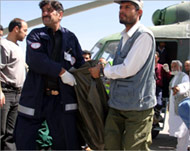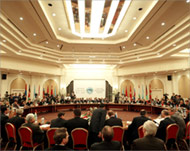China’s ‘war on terror’ under scrutiny
One of the first nations to express its condolences to the United States following the September 11 attacks, China was quick to respond to President Bush’s invitation to join what he described as the war on terror.

Two recent events, however, have spotlighted China’s use of this ambiguous phrase in a manner that the US State Department would now be hard put to approve.
The first occurred in early June when eleven railway workers – part of several hundred Chinese labourers now operating in Afghanistan on reconstruction projects – were mowed down in their tents.
The following day, while the motive behind the assault was still unclear, China’s leaders blamed “terrorists”, a charge that still sticks in official statements, although the Chinese media has speculated that neighbouring warlords and/or competing economic interests might have been to blame.
Beijing’s haste in condemning “terrorists” has been given a further twist by a new report of the human-rights group, Amnesty International, which accuses China of arbitrarily using terms such as “war on terror” and “terrorist” to justify a policy of political, cultural, economic and civil oppression in the traditionally Muslim province of Xinjiang.
Eye on Uyghurs
Restrictions on religious practices, closing down of mosques, use of torture to extract confessions and slanted trial procedures are some of the complaints listed in the 40-page report, that concludes with a plea to Beijing to put an end to violations of human rights across the province.
 |
|
Xinjiang is seen by China’s rulers |
That a country should seek to interpret the word “terrorist” to suit its own ends may not come as a surprise to observers of recent US actions in the Middle East. Even so, Mark Allison of Amnesty International says China is guilty of reneging on basic human-rights commitments made when signing the UN Declaration on Human Rights.
“Since September 11, China has tried to dress up its actions in the region but some of the arrests we know of involve people who were demonstrating through peaceful means,” said Allison.
A place of exile in imperial times, Xinjiang has long been seen as an area of potential trouble, with local minority groups speaking languages and following cultures more closely attuned to Central Asia than Eastern China.
An ongoing policy of economic development is aimed at rejuvenating Western China, but this has also brought in millions of Han Chinese who have descended on the oil-rich region, fuelling claims of racial bias in the job market, insensitivity to local culture, heavy-handedness by officials when resolving problems, and even claims by some activists of an official policy of Han colonisation.
Perceived threat
“My feeling was that the local Muslims are not very devout, not very observant in their religion. It is more a part of their identity rather than a great cause,” Christian Tyler, a former journalist and author of a book on Xinjiang, told Aljazeera.net.
|
“My feeling was that the local Muslims are not very devout, not very observant in their religion. It is more a part of their identity rather than a great cause” Christian Tyler, author of book on Xinjiang |
“China sees Islam as a political threat that motivates people to break away. They fear Islam and anything that goes on in Xinjiang nowadays is blamed on Islamic zealots.
“However, they do not realise that the reasons some minority groups members are breaking away is because of the way China is treating them.”
In official literature blaming “outside forces”, the Chinese Government has gone to great pains to stress the links between so-called Xinjiang separatist movements and groups like al-Qaida.
During the initial US assault on Afghanistan following the September 11 attacks, Chinese authorities maintain, some 300 Uyghurs (one of the minority groups in Xinjiang) were captured by US troops while over 600 escaped to Pakistan.
By contrast, Amnesty International says it only knows of 22 Uyghurs being held by US forces One Western diplomat told Aljazeera.net that the claims made by Beijing linking Xinjiang to al-Qaida are tenuous at best.
Other hot spots
Wang Yizhou of the Chinese Academy of Social Sciences says “outside forces” are to blame for aggravating local tensions and encouraging violence. An expert on terrorism, Wang pointed to the late 1990s when a series of riots and deadly bus bombings shook the region.
 |
|
China blamed ‘terrorists’ for the |
“Al-Qaeda has tried to separate Xinjiang from China. They want to create a separate Muslim state in Central Asia and are using existing tensions between ethnic groups to achieve it.
“You must also remember that, in China, the major policy of the government is to ensure national cohesion,” Wang says, suggesting that the government will countenance no opposition or suggestion of local autonomy for fear of the message that might send to other potential flashpoints, namely Taiwan, Tibet and Hong Kong.
In addition, Wang says, China faces terrorist threats to its interests abroad – most notably to its fuel needs of which more than 40% comes from overseas. Only last week, a Hong Kong-registered oil tanker refused to stop at the Iraqi port of Basra after reports that an armed group had threatened to attack any vessels appearing to aid the US.
“China does suffer from terrorist attacks in Xinjiang,” says Mei Renyi, a specialist in Sino-US relations at the Beijing Foreign Languages University. “Since the break-up of the USSR, Central Asia has been very unstable, with many extreme Muslim groups spread across the region.”
Realpolitik
The presence of such groups in Central Asia is already well documented but, according to Col. Christopher Langton of the London-based International Institute of Strategic Studies (IISS), the connections these groups may have with Xinjiang are unclear based on the limited information available.
|
“Since the break-up of the USSR, Central Asia has been very unstable, with many extreme Muslim groups spread across the region” |
Despite the doubts expressed by some specialists about the real nature of “terrorist” activity in Xinjiang, the US administration post-September 11 agreed to include a number of Uyghur Muslim groups in its list of “international terrorist organisations” – something it had previously refused to do given the scanty evidence and concerns over human-rights abuses.
At the time, with Washington looking to build its alliance against “terror”, the move looked like a victory for realpolitik over idealism.
But Mei cautions against seeing the turn of events as mere opportunism on Beijing’s part.
 |
|
China’s attitude to ‘separatists” |
“Before 11 September 2001, China took the view ‘one man’s terrorist is another man’s freedom fighter’. The government and media used phrases such as ‘splittist’ or ‘separatist’ rather than ‘terrorist’ when discussing problems in Xinjiang,” he said.
“After September 11, though, the picture became much clearer with regard to the scale of al-Qaida/Taliban operations and links with China.”
China has also been using the “war on terror” to help cement relations with its co-members at the Shanghai Cooperation Organisation (SCO).
Founded initially to resolve long-standing border disputes with neighbouring countries, the SCO counts as it members Russia and various Central Asian states – all of whom have large Muslim populations and poor human-rights records.
Deft diplomacy
Meeting last month in the Uzbekistan capital of Tashkent – the centre for SCO anti-terrorism operations – China pledged to provide $900 million in loans to Central Asia in what experts saw as a means to expand its own influence in the area.
“China has traditionally seen Central Asia as being within its orbit,” Adam Ward, a China specialist at IISS, told Aljazeera.net.
 |
|
Central Asia’s Muslim states are |
“Since US involvement in Afghanistan, the region has become very complicated and China is now trying to push back US influence via a whole host of issues such as trade agreements and border-security issues.”
All of which will be of concern to the US, which faces pressure from vocal human-rights campaigners to take a tougher stand vis-a-vis the same Central Asian states that China is trying to woo.
Ward says Beijing is becoming deft with diplomacy.
“By stressing links to the al-Qaida/Taliban, China was able to subsume the issue of Xinjiang into the ‘war on terror’ and so gain international backing,” he said.
“Now Beijing realises the need for a ‘hearts and minds’ campaign through economic cooperation, for allaying other nations’ fears of a hegemonic rise and acknowledging their security concerns.”